
JOURNAL OF THE GEOLOGICAL SOCIETY OF INDIA
Scope & Guideline
Fostering scholarly dialogue in Earth and Planetary Sciences.
Introduction
Aims and Scopes
- Geochemistry and Mineralogy:
The journal focuses on the geochemical and mineralogical characterization of various geological materials, emphasizing their implications for resource exploration and environmental impact. - Hydrogeology and Groundwater Studies:
A significant portion of the publications addresses groundwater quality, sustainability, and the impacts of geological formations on hydrological systems. - Tectonics and Structural Geology:
Research often explores tectonic processes, structural analysis, and their implications for geological hazards, particularly in seismically active regions. - Paleontology and Sedimentology:
Studies on fossil records, sedimentary processes, and paleoenvironmental reconstructions are key components, providing insights into Earth's historical changes. - Geospatial Analysis and Remote Sensing:
Utilization of advanced geospatial techniques and remote sensing for mapping, analysis, and monitoring geological features and processes is a prominent methodological focus. - Environmental Geoscience:
The journal emphasizes research on the environmental impacts of geological activities, including mining, land use changes, and climate change effects on geological processes.
Trending and Emerging
- Climate Change Impacts on Geology:
There is an increasing focus on understanding the effects of climate change on geological processes, including erosion, sedimentation, and natural hazards. - Sustainable Resource Management:
Research emphasizing sustainable practices in resource management, including the assessment of mineral resources and their environmental impacts, is gaining traction. - Advanced Geophysical Techniques:
The use of innovative geophysical methods for subsurface exploration and monitoring is on the rise, enhancing the understanding of complex geological systems. - Geological Hazards and Risk Assessment:
Publications related to the assessment and management of geological hazards, such as landslides and earthquakes, are trending, reflecting growing societal concerns. - Interdisciplinary Approaches:
An emerging trend is the integration of geological research with disciplines such as ecology, urban planning, and public health to address complex environmental issues.
Declining or Waning
- Traditional Mineral Exploration:
There appears to be a waning interest in conventional mineral exploration studies, possibly due to a shift towards more sustainable and environmentally responsible resource management. - Geological Mapping of Lesser-Known Regions:
Research focusing on geological mapping of less-explored areas has reduced, as attention shifts towards more pressing environmental and geological issues. - Static Geological Models:
The trend towards static geological models has decreased, with a growing preference for dynamic modeling approaches that consider changing environmental conditions.
Similar Journals
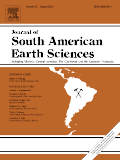
JOURNAL OF SOUTH AMERICAN EARTH SCIENCES
Connecting Past and Present in Earth SciencesJOURNAL OF SOUTH AMERICAN EARTH SCIENCES is a premier interdisciplinary journal dedicated to publishing high-quality research in the fields of Earth-Surface Processes, Geology, and Paleontology, making it an essential resource for scientists and researchers focused on South American geology and its diverse geological phenomena. Published by Pergamon-Elsevier Science Ltd in the United Kingdom, this journal has been instrumental in disseminating groundbreaking studies since 1988, showcasing contributions that push the boundaries of knowledge in Earth and Planetary Sciences. With an impressive Scopus ranking—positioning it in the 74th percentile for Paleontology and 71st for Geology—this journal not only reflects robust academic quality but also its commitment to addressing critical geological challenges in South America. Researchers will appreciate its objective of advancing understanding of geological processes while providing insights into past, present, and future Earth environments. Although available through traditional subscription models, the journal's vast repository of articles enriches the academic landscape, facilitating the sharing of vital research among professionals, students, and geological practitioners.

GEOLOGICA ACTA
Unveiling the Earth’s secrets through open-access research.GEOLOGICA ACTA is a distinguished open-access journal dedicated to the field of geology, published by Universitat de Barcelona since its inception in 2003. With an impact factor that reflects its relevance in the academic community and a commendable Q2 ranking within the Earth and Planetary Sciences category, this journal is committed to disseminating high-quality research that spans various aspects of geological sciences. The journal's broad scope encompasses both theoretical and applied research, making it a vital platform for researchers, professionals, and students alike to share their findings with a global audience. With its Open Access policy, GEOLOGICA ACTA ensures that all published articles are freely accessible, fostering collaboration and innovation in the geological community. Based in Barcelona, Spain, at the Geociences Barcelona (CSIC), it plays a pivotal role in connecting scholars from diverse backgrounds and advancing the field of geology through rigorous peer-reviewed articles.
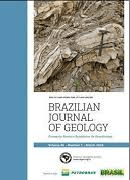
Brazilian Journal of Geology
Fostering Excellence in Geoscientific ResearchBrazilian Journal of Geology, the flagship publication of the SOC BRASILEIRA GEOLOGIA, has been a beacon of geoscientific research since its inception in 2013. With an ISSN of 2317-4889 and an E-ISSN of 2317-4692, this open-access journal has facilitated the dissemination of high-quality research across various branches of geosciences, making it freely accessible to a global audience since 2014. Hailing from Brazil, the journal proudly holds a Q2 ranking in Earth and Planetary Sciences as of 2023, and ranks #73 out of 195 in Scopus, indicating its growing impact and relevance in the field. The Brazilian Journal of Geology aims to bridge diverse geological studies with interdisciplinary approaches, promoting the understanding and application of geology in addressing contemporary scientific challenges. As it converges research from 2013 to 2024, the journal not only enriches the academic landscape but also serves as a vital resource for researchers, professionals, and students eager to explore the complexities of the Earth and its processes.

Spisanie Na B Lgarskoto Geologichesko Druzhestov-Review of the Bulgarian Geological Society
Unveiling the complexities of Earth's processes.Spisanie Na B Lgarskoto Geologichesko Druzhestov-Review of the Bulgarian Geological Society, published by the BULGARIAN ACADEMY OF SCIENCE, serves as a leading platform for the dissemination of pioneering research and comprehensive reviews in the field of geology. With the ISSN 0007-3938 and E-ISSN 1314-8680, this esteemed journal underlines its commitment to advancing geological sciences, particularly pertinent to the Bulgarian context but with broader implications for global studies. While the journal does not currently offer open access options, its rigorous peer-review process ensures high-quality publications that enrich the geological literature. The journal aims to bridge the gap between theory and empirical research, fostering collaboration among researchers, professionals, and students. With its strategic location in Sofia, Bulgaria, it stands as a vital resource for those keen on exploring the complexities of Earth sciences and contributes significantly to the prestige of the Bulgarian geoscience community.
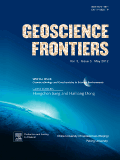
Geoscience Frontiers
Advancing Earth Sciences Through Open AccessGeoscience Frontiers is a premier open-access journal that has been at the forefront of disseminating impactful research in the field of Earth and Planetary Sciences since its inception in 2010. Published by China University of Geosciences, Beijing, this journal operates from the Netherlands and has gained recognition for its rigorous peer-review process and high standards of scholarship, earning a distinguished position as Q1 in the Earth and Planetary Sciences category. With a Scopus ranking of 5 out of 195, placing it in the 97th percentile, it reflects the journal's commitment to addressing global geological challenges and advancing our understanding of the Earth’s dynamic systems. As an open-access platform, Geoscience Frontiers ensures that vital research is widely accessible, fostering collaboration and innovation among researchers, professionals, and students alike. By providing a forum for cutting-edge discoveries and theories, the journal plays a critical role in shaping the future of geoscientific research and education.
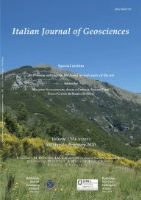
Italian Journal of Geosciences
Transforming Knowledge: Open Access to Earth Science BreakthroughsItalian Journal of Geosciences, published by the Società Geologica Italiana, is a distinguished platform for the dissemination of research in the fields of Earth and Planetary Sciences and Geology. With an impressive impact factor reflected in its 2023 rankings, where it placed in the Q3 category across its related fields, this journal serves as a vital resource for academics, practitioners, and students. Established in 2010 and poised to continue until 2024, the journal showcases critical advancements and interdisciplinary studies that deepen our understanding of geological processes and Earth systems. Operating under open access options, it offers robust accessibility to a broad audience, facilitating wider dissemination of knowledge. The journal's affiliation with Università degli Studi La Sapienza in Rome, Italy, further underscores its commitment to academic excellence and innovation in geosciences.

Andean Geology
Illuminating the Rich Tapestry of Andean GeologyAndean Geology is a prominent open-access journal, published by the SERVICIO NACIONAL GEOLOGIA MINERVA in Chile, dedicated to advancing the fields of geology, geochemistry, petrology, paleontology, and stratigraphy. Since its inception in 2009, the journal has provided a vital platform for the dissemination of research pertaining to the Andean region and beyond, featuring high-quality articles that contribute to our understanding of earth sciences. With an impressive ranking in the Q2 and Q3 quartiles across multiple categories, it reflects a growing impact in the geological community, evidenced by its status within Scopus rankings. Andean Geology not only supports the academic pursuit of knowledge with its open-access policy but also aims to foster collaboration among researchers and professionals worldwide, ensuring wide accessibility of groundbreaking research and promoting academic engagement. By covering a diverse array of topics relevant to the dynamic field of geology, this journal serves as an essential resource for students, professionals, and scholars dedicated to earth and planetary sciences.
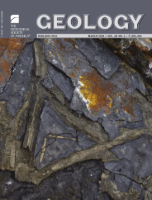
GEOLOGY
Advancing Earth Sciences Through Innovative ResearchGEOLOGY, published by the Geological Society of America, Inc, is a premier journal dedicated to advancing knowledge, research, and discussion in the field of geology. With an ISSN of 0091-7613 and an E-ISSN of 1943-2682, this journal stands out with an impressive Q1 ranking in Geology for 2023, positioning it among the top journals in the realm of Earth and Planetary Sciences, specifically holding a remarkable rank of 11 out of 321, reflecting its 96th percentile status. This journal aims to publish innovative research articles that cover all aspects of geology, from tectonics and sedimentology to paleontology and mineralogy, offering invaluable insights for researchers, professionals, and students alike. Although not currently open access, GEOLOGY maintains a rigorous review process ensuring the quality and integrity of the research it publishes. For more than five decades, spanning from its inception in 1973 to the upcoming publications in 2024, GEOLOGY has been instrumental in shaping the geological discourse and continues to be a vital resource for the scientific community.
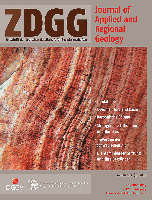
Zeitschrift der Deutschen Gesellschaft fur Geowissenschaften
Championing Earth Exploration: A Hub for Scientific InquiryZeitschrift der Deutschen Gesellschaft für Geowissenschaften is a prominent academic journal published by E Schweizerbart’sche Verlagsbuchhandlung, dedicated to advancing research in the field of Earth and Planetary Sciences. With its ISSN 1860-1804 and E-ISSN 1861-4094, this journal provides a platform for researchers to disseminate high-quality scientific articles and insights that contribute to our understanding of geological and environmental phenomena. Over the years, it has established itself as a reputable source within its category, holding a Q3 ranking among the Earth and Planetary Sciences (miscellaneous) journals in 2023, and achieving an impressive 85/195 rank in Scopus, placing it in the 56th percentile. The journal is published from Germany, specifically at Johannesstraße 3A, D 70176 Stuttgart, where it fosters a collaborative environment for scholars, professionals, and students alike. Although currently not an Open Access journal, it offers critical insights into various geoscience topics, making it an essential resource for those engaged in geological research and education. With its converged years stretching from 2008 to 2024, Zeitschrift der Deutschen Gesellschaft für Geowissenschaften is poised to continue its impactful role in the geosciences community.
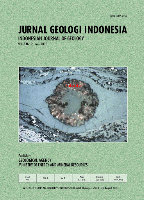
Indonesian Journal of Geoscience
Fostering Collaboration in the Heart of Geoscience Research.Indonesian Journal of Geoscience, published by the GEOLOGICAL AGENCY, is a vital platform for sharing cutting-edge research in the field of Earth and Planetary Sciences. With an ISSN of 2355-9314 and E-ISSN of 2355-9306, this open-access journal has been making significant contributions to the geoscientific community since its establishment in 2013. Operating out of Bandung, Indonesia, the journal is dedicated to disseminating high-quality research across diverse areas, making it an essential resource for researchers, professionals, and students alike. Recognized in the 2023 Q2 category in Earth and Planetary Sciences, it currently ranks #134/195 among general Earth and Planetary Sciences journals in Scopus, reflecting its growing prominence and academic rigor. The journal seeks to foster scientific discussions by publishing original research, reviews, and case studies that address contemporary challenges and advancements in geoscience, thus contributing to a deeper understanding of our planet. With its commitment to open access, the Indonesian Journal of Geoscience ensures that vital research is accessible to a global audience, encouraging collaboration and innovation in the field.